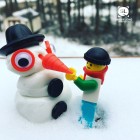First, I want to tell you how hard “So Silent and Still” hit me. The way pain unfolds in it is just lovely. It is such a small space, flash, which we fill with such hard emotions, but I think it’s rare to see pain unveiled as slowly and delicately as you do here. What draws you to this minimal form?
Thank you. I love writing about small moments, deeply felt, and I think flash lends itself to that kind of exploration—writing that’s the opposite of epic.
One of my favorite things about “So Silent and Still” is the fact that immediately I wanted to read it out loud. Sound and rhythm are forefronted so that it reminds me both of poetry and of children’s books, in all the best ways. Do you have a strong connection to those genres? How do you think they speak to flash if you do?
I’m so glad you picked up on that connection! This is one of those stories that I heard in my head before I put it on the page, and the rhythm and repetition are essential. They’re where the story started—the image of that folder and the words “Trapper Keeper.” You know how you can sometimes fixate on a common word and say it over and over and it becomes strange to you? That happened with “Trapper Keeper.” And I love children’s and young adult literature, and especially stories where someone discovers a secret world that exists beside our own, and I think elements of that come through in this story.
I always wrote stories, going back to when I was really young, and then I went through an adolescent-gloomy-bad-black-eyeliner poetry phase for a while, and then I said nope, no poetry, but I think flash is my way of writing poetry. Hopefully not the gloomy, bad kind! But stories come to me through image and sound. Those elements are not always in the forefront in traditional plot-driven fiction, but they’re essential in flash.
The question of voice here is so poignant. I think we think of it as a binary—either you have a voice or you don’t—but this seems to offer a more complicated view as it allows us to witness the time period when a child learns to choose silence. Can you talk about your own relationship with your voice (or your silence)?
It’s complicated and contradictory. It probably is for most writers. I’m an introvert; I live in my head, and I’m not always happy being dragged out of it. Small talk, parties, social events—those are my kryptonite. But at the same time, even if you’re writing alone in your room, you’re still writing, not just thinking. And writing assumes there will be a reader. I’m a very private person. Most people I interact with probably have no idea I’m a writer, and I’m OK with that. But then if you Google me, there I am.
So the child in my story has a private world that, for her, is incredibly rich and fascinating, and part of her wants to share it with people, but the other part of her is saying, “No, don’t, they’ll just make fun of you.” Not without reason! But I don’t see her silence as weakness. She’s protecting that private world, keeping it alive inside her.
What are you reading right now?
I’m a multitrack reader, so I’ve always got several books going—classics and contemporary and YA and graphic novels. Right now I’m reading Madame Bovary, because somehow I never got around to it before, and I’m also reading a young adult horror novel called The Sacrifice Box, set in the eighties—sort of like if Black Swan Green were written by Stephen King—and I’ve been binge-reading a graphic novel series called Saga. I’m on the library waiting list for Kim Magowan’s short story collection Undoing, and there are two recent poetry collections I loved, Doe by Aimee Baker and I Am Not Your Final Girl by Claire C. Holland.
Is there anything you need when you are writing (a talisman, a food, a space, etc.)?
Coffee always helps! But I’m not someone who writes in coffee shops. I need a quiet place. I usually write alone, but I can also write with other people if they’re also writing—I have a wonderful writing group, and we always have at least twenty minutes of silent writing, and that’s such a productive time for me.



 The core workshop of SmokeLong Fitness is all in writing, so you can take part from anywhere at anytime. We are excited about creating a supportive, consistent and structured environment for flash writers to work on their craft in a community. We are thrilled and proud to say that our workshop participants have won, placed, or been listed in every major flash competition. Community works.
The core workshop of SmokeLong Fitness is all in writing, so you can take part from anywhere at anytime. We are excited about creating a supportive, consistent and structured environment for flash writers to work on their craft in a community. We are thrilled and proud to say that our workshop participants have won, placed, or been listed in every major flash competition. Community works.